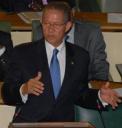By David Jessop
Some time before the end of June this year the Caribbean will sign in Barbados an Economic Partnership Agreement (EPA) with Europe. In doing so, all but one of the region’s independent states will make a fundamental break with their past and start down a largely uncharted journey. Cuba, so far outside of the EPA, arguably embarked on this process in its own way following the collapse of the Soviet Union.
The signing will mark a challenging new step in the Caribbean’s post-colonial history and will leave no one but the leaders who guide the region’s fortunes, its business community and its institutions responsible for future success or failure.
 Last December Caribbean and European trade negotiators initialled the text of the EPA. Since then an important public debate about the implications has been underway. This was led by three of the region’s leading academicians, Professors Norman Girvan, Havelock Brewster and Vaughan Lewis who expressed serious reservations about the EPA text, its implications and omissions. In parallel there has been a Caricom commissioned enquiry into the conduct of the negotiations and implicitly the future of the Caribbean Regional Negotiating Machinery (CRNM), in the margins of which simmering differences and inter-institutional rivalries emerged.
Last December Caribbean and European trade negotiators initialled the text of the EPA. Since then an important public debate about the implications has been underway. This was led by three of the region’s leading academicians, Professors Norman Girvan, Havelock Brewster and Vaughan Lewis who expressed serious reservations about the EPA text, its implications and omissions. In parallel there has been a Caricom commissioned enquiry into the conduct of the negotiations and implicitly the future of the Caribbean Regional Negotiating Machinery (CRNM), in the margins of which simmering differences and inter-institutional rivalries emerged.
However, a little over a week ago these concerns were largely put to rest when Caribbean Heads of Government met in Nassau.
There they took a number of important decisions following what has been described variously as a strong, positive and sometimes inspirational presentation, by Jamaica’s Prime Minister Bruce Golding, who was speaking in his capacity as the lead Head of Government for External Trade Negotiations.
In Nassau highly placed sources suggest that Mr Golding told his fellow heads that no other issue that they had before them was more important than the EPA. He refuted in detail the principal arguments against renegotiation or delaying signing, set out the elements of the agreement and addressed the issue of inter-institutional differences. He also praised the achievement of the CRNM but recognised the contentious nature of its governance.
He coupled this with a stress on implementation and the need for immediate action to develop the institutional mechanisms, the establishment of national co-ordinators in Cariforum member states, and the need for a full and accessible road map from Caricom if the region is to be able to implement the EPA.
In his remarks he is understood to have pointed to the challenges, the need for regional companies to be facilitated and encouraged to become global in outlook and to increase productivity and become efficient.
He also urged consideration of how to position the region so that it can take full advantage of the almost fully liberalised access it now has for goods and services in Europe. Ireland was, he suggested, an interesting example of how a nation can go to the international community with an attractive investment model based on changed economic relationships.
The outcome was agreement to proceed to the signing of the EPA by June 30. This delay is predominantly for legal reasons.
The document has to be translated into French for Haiti; what is known as the final legal scrub has to be undertaken; there are still issues with the EC over the precise detail of the three-year moratorium before tariff cuts begin; Barbados’s new government is to undertake a technical review; some nations require a debate in Parliament; and the final document has to be translated into all EU languages and approved by the EU Council.
Also agreed was a review of the region’s institutional arrangements relating to the governance of trade negotiations – should the CRNM in future be under the control of Caricom and how as a regional non-treaty institution should it relate to trade ministers? Here it was agreed that, led by Jamaica, a committee of Heads of Government from Trinidad, Barbados, Guyana, Antigua and Grenada and the CRNM would look at governance relationships.
In addition, it was agreed that trade negotiations with Canada and the Dominican Republic should proceed.
What has been striking in the past few months has been the distance between the vision of Caribbean leaders, and public understanding of the dramatic change in thinking and institutional dynamics that will be required to successfully deliver the economic reorientation that the EPA presages.
On the subject of vision, the origins and objectives of the negotiations are clear. As Barbados former Prime Minister Owen Arthur noted in an important lecture delivered on March 11 at the University of the West Indies Cave Hill campus, the EPA, while not perfect, stemmed from a shared vision among Caribbean Heads of Government of where the region had to go.
“Everyone involved in the exercise understood that an EPA with the European Union would mark a fundamental break with the past, not just in our relations with Europe but even more so to the status of the Caribbean economy in the global economic arena.
“Everyone also understood that it could come to herald the beginning of a new kind of future for the Caribbean, in which new power relationships and new rules of economic engagement that are strange and testing for the Caribbean, would come to play a defining role in both the Caribbean’s international economic relations and the internal ordering of the Caribbean’s economic affairs.”
On implementation uncertainty prevails. So much so, that the issue now is whether the region’s institutions have the power, the structure, the creativity or an understanding of the urgency of constructing the enabling environment that will determine whether this vision becomes real.
Caricom is developing an implementation plan and road map as to how to proceed. The Caribbean Development Fund has still to be established and funded. Beyond supporting infrastructural development it has yet to be determined how it will drive enterprise competitiveness and investment promotion.
The question that remains unspoken in both the Caribbean and externally is whether these and other regional institutions have enough understanding of business – in particular of the services sector and how its future is central to the regional economy – to deliver a positive outcome from the EPA.
Famously Britain’s last Prime Minister said that his country’s future was about “education, education, education.” For the Caribbean governments, regional institutions and the private sector the message now has to be “implementation, implementation, implementation.” It is a theme I intend returning to in future columns.
Previous columns can be found at www.caribbean-council.org
Editor’s note: There will be no column by David Jessop for the next two weeks.








